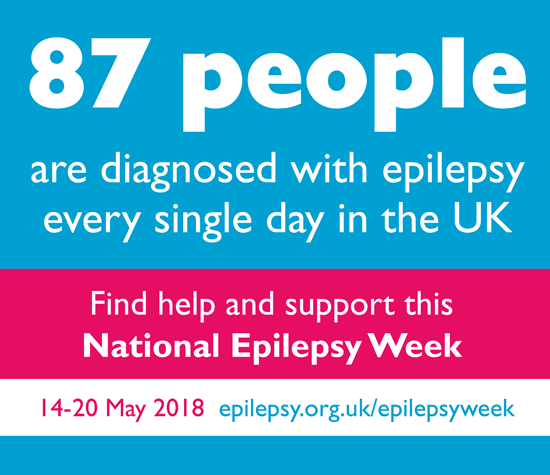NWP Blog
National Epilepsy Week
9 May 2018

National Epilepsy Week
This campaign will take place from Monday 14th May 2018 until Sunday 20th May 2018 and is continuing Epilepsy Actions' work to empower people to seize control of their epilepsy, through better care and access to treatment. The leading charity for this campaign is Epilepsy Action. Out of 600,000 people living with epilepsy in the UK, 288,000 are still experiencing seizures. So make a difference and get involved with #epilepsyweek events.
- Epilepsy Action
- How can you get involved with National Epilepsy Week?
- What is Epilepsy?
- What are Epileptic Seizures?
- What are the common triggers of epileptic seizures?
- Epileptic Seizure Prevention Tips
- What are the causes of epilepsy?
- What are the symptoms of epilepsy?
- How is epilepsy diagnosed?
- When to seek medical advice for epilepsy
- Epilepsy Charities
Epilepsy Action
Epilepsy Action is a community of people committed to a better life for everyone affected by epilepsy. They help to provide high quality, accessible epilepsy healthcare services, so that people with epilepsy have the support they need to manage their condition. They also raise wider awareness and understanding of epilepsy, so that people living with the condition are treated with fairness and respect.
How can you get involved with National Epilepsy Week?
Make a Donation
Fundraising for Epilepsy Action
Take part in fundraising events
Subscribe to their newsletter to keep informed
Join and support campaigns
Take part in research
Follow their Facebook Page to keep up to date
Follow their Twitter Page to keep up to date
Visit their Shop
What is Epilepsy?
Epilepsy is a common condition that affects the brain and causes frequent seizures. Seizures are bursts of electrical activity in the brain that temporarily affect how it works. They can cause a wide range of symptoms. Epilepsy is a condition that affects the brain. When someone has epilepsy, it means they have a tendency to have epileptic seizures.
What are Epileptic Seizures?
Electrical activity is happening in our brain all the time, as the cells in the brain send messages to each other. A seizure happens when there is a sudden burst of intense electrical activity in the brain. This causes a temporary disruption to the way the brain normally works. The result is an epileptic seizure. There are many different types of seizure. What happens to someone during a seizure depends on which part of their brain is affected. During some types of seizure the person may remain alert and aware of what’s going on around them, and with other types they may lose awareness. They may have unusual sensations, feelings or movements. Or they may go stiff, fall to the floor and jerk.
What are the common triggers of epileptic seizures?
Epileptic seizures are often associated with particular triggers or changes in your daily habits or routine. Here are some common behaviors and factors that may trigger an epileptic seizure:
- Stress, anxiety, or other emotional issues
- Alcohol or drug abuse or the process of quitting alcohol or drugs
- Change in sleep schedules, feeling very tired, or significant sleep deprivation
- A change in medications, or skipping or missing a dose of anti-seizure medication
- Something that overstimulates the senses, like lights that flash brightly, watching television, playing video or computer games, or working on a computer
- Hormonal changes in women, often from pregnancy or menstruation
- Mental strain, such as from solving complex problems
- You can't always predict what will trigger an epileptic seizure; sometimes they'll occur for no apparent reason. But many people are able to see a correlation between certain behaviors and their seizures. By taking steps to minimize these factors, you may be able to prevent seizures.
Epileptic Seizure Prevention Tips
Here are some tips that may help reduce your risk of having an epilepsy seizure:
- Get plenty of sleep each night — set a regular sleep schedule, and stick to it.
- Learn stress management and relaxation techniques.
- Avoid drugs and alcohol.
- Take all of your medications as prescribed by your doctor.
- Avoid bright, flashing lights and other visual stimuli.
- Skip TV and computer time whenever possible.
- Avoid playing video games.
- Eat a healthy diet.
What are the causes of epilepsy?
- head injuries
- infections like meningitis
- brain tumours
- subarachnoid haemorrhages
- strokes
- birth injuries
- problems with the brain developing during childhood
What are the symptoms of epilepsy?
- uncontrollable jerking and shaking – called a "fit"
- losing awareness and staring blankly into space
- becoming stiff
- strange sensations – such as a "rising" feeling in the tummy, unusual smells or tastes, and a tingling feeling in your arms or legs
- collapsing
- temproary confusion
- loss of consciousness
- diziness
How is epilepsy diagnosed?
The main way doctors diagnose epilepsy is by taking a detailed description of the seizures. They may also arrange for some tests to help give them more information about the possible type and cause of the epilepsy. This can also help rule out any other conditions that could be causing seizures. These tests can include blood tests, an EEG (recording of the brainwaves) and brain scans. But there isn’t a single test that can prove if someone does or does not have epilepsy. To find out more about epilepsy treatments visit https://www.nhs.uk/conditions/epilepsy/treatment/
When to seek medical advice for epilepsy
See your GP if you think you might have had a seizure for the first time. This doesn't mean you have epilepsy, as a seizure can have several causes and sometimes they're just a one-off, but you should see a doctor to find out why it happened.
Call 999 for an ambulance if someone:
- is having a seizure for the first time
- has a seizure that lasts more than five minutes
- has lots of seizures in a row
- has breathing problems or has seriously injured themselves
Epilepsy Charities


 TRUST
TRUST
Post Comments